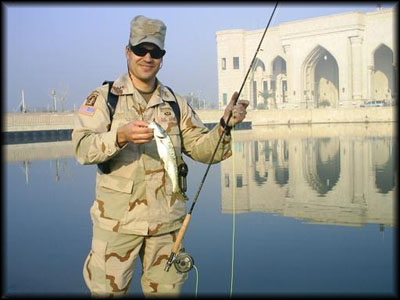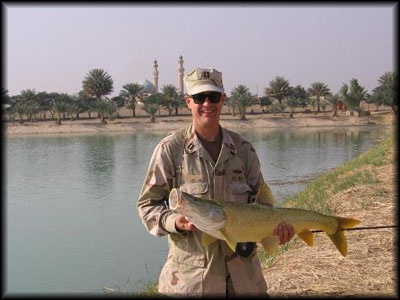
Photography || Portfolio Site || Blog || About || Contact || Home ||
Flyfishing in ... Baghdad
Published March 11, 2007 in OutThere section of Bozeman Daily Chronicle
By JOSHUA BERGAN
Sitting on the banks of a pond in the middle of what used to be Saddam Hussein's presidential palace complex in Baghdad, an American soldier digs through his fly box, selecting an elk hair caddis. The tried and true fly is an old standby even for the 30-inch carp he's pursuing. Casting his fly, the soldier notices something break the surface. But rather than rising fish, it is rounds fired from an AK-47. It’s not necessarily threatening, but it’s a far cry from the solitude of the rivers that Great Falls’ Joel Stewart was used to.
A lieutenant commander in the U.S. Navy, Stewart packed his fly rod when he was deployed to Iraq in February 2005, knowing he’d need an escape from the war.

Photo courtesy baghdadflyfishing.com
Deer Lodge’s (Mont.) Bill Jones was like-minded.
"I knew there were lakes where I was going in Baghdad and I knew this was going to be a bad tour," Jones, an Army lieutenant colonel, said. "Flyfishing was going to be just the ticket to keep me sane."
When Stewart was granted time for rest and relaxation from his tour in Iraq, he'd be on the business end of his rod, fishing the man-made ponds in Baghdad for asps, shaboot, mangar, common carp, grass carp, barbel and stinging catfish (all of which would be considered rough fish in America) throughout "Camp Victory," the U.S. Army base that sits in the former dictator's complex. Fellow troops would ask him about it, and he'd give on-the-spot mini-lessons.
"Then the idea hit me that it would be a great thing to teach soldiers how to fly fish and get a bit of R&R time in while in a combat zone," Stewart said via e-mail on his current deployment to Standing NATO Maritime Group One, deployed to the Atlantic Ocean on board an Arleigh Burke-class destroyer.
Thus, Stewart founded the Baghdad School of Fly Fishing.
He shared the art of fly-fishing with about 40 fellow soldiers, until he left Iraq in February 2006. Since then, more than 150 more soldiers have graduated.
For a couple of hours a week, the troops would set their guns aside and arm themselves with fly rods. But their weapons were always close at-hand.
"Hearing small arms fire was a daily norm," Stewart said. "It might be a fire-fight, it might be training, or it might just be someone, not a soldier, who is just shooting off their AK-47 out in town. Lots of times you'd see something splash into a lake and it would be a bullet. The closest I came to real fire was when a rocket that insurgents shot at the compound, splashed down on the far side of a lake I was fishing. That startled the hell out of me!"
Jim Druell, formerly stationed at Great Falls' Malmstrom Air Force Base and current dean of the school, had similar experiences.
"Nothing beats seeing someone hook into a fish while small arms rounds hit the water near you," Druell said on the school's website. "The bent rod with the mist created by the rounds’ impact will forever be etched in my memories."
The ponds where the soldiers fish were constructed by order of Hussein. The fish they are catching were stocked by his order. But during his regime, he and his cronies were the only ones allowed to fish those ponds.
That changed when the American troops pulled Hussein out of the spider hole.
Today Iraqis fish for sustenance, but also for sport.
Stewart said he thinks the Iraqis like it that the American troops fish.

Photo courtesy baghdadflyfishing.com
"I know they loved it when we gave them a fish," Stewart said.
In the school's early days, only the gear that Stewart brought with him was available. Stewart posted a message on an online outdoors message board, asking for donations.
North Carolina’s Ed Laine saw the request and championed the cause.
"I just said to Joel, 'What do you need and how many,'" Laine, a former Army lieutenant, said from his home in Charlotte. "I lined all the reels and put backing on them, and packed them up and shipped them off."
Since then, the school has received innumerable donations; everything from books to fly tying supplies to rods and reels to flies themselves.
Stewart has taken monster fish with small minnow patterns, woolly buggers, caddis patterns and fresh water shrimp patterns.
"In my last tour I'd discovered that the monster carp in the lakes of Tikrit could be enticed to take an elk hair caddis or a sparkle dun," said Jones, a dean of the school for a period in 2006.
The fish were everything from voracious and easy to catch (asps), to smart and difficult to catch (mangar). But Stewart noted that the carp were the most challenging.
"You have to put the fly right on them. Splash it down and they are gone in a cloud of mud."
Based on their size, one might guess these fish had migrated out of the Euphrates during the birth of civilization.
"If they were trout, I'd be giddy," Stewart said. "I was looking at a particularly big one when I started to see a yellow-green tint to the water below him. The 'tint' started to take shape and form. I've caught mangar before in Tikrit so I knew what I was about to see. But I had no idea big this thing was going to be! Let me put this in perspective: I just mentioned the 'steelhead-size' fish we were watching? We could have used them for bait. This was easily a 40+-pound fish."
Lieutenant commander Stewart taught his fellow soldiers a hobby they can enjoy the rest of their lives. But more importantly, he offered a piece of home, and an escape from the stress of war.
"Anything I can do to help a fellow service member to get through a deployment is a good thing," he said. "It is the best feeling in the world to know that you gave someone a bright spot in their day."